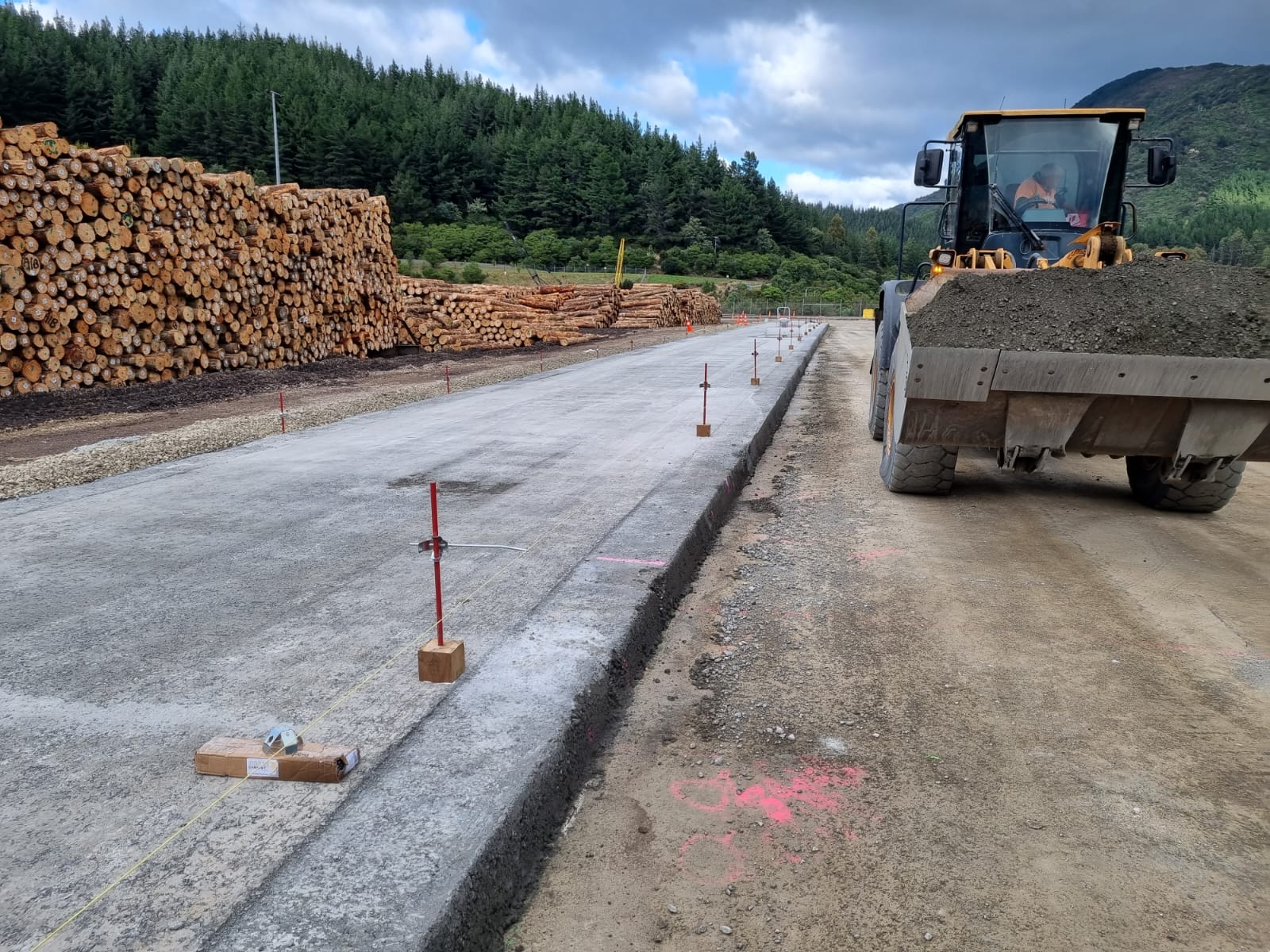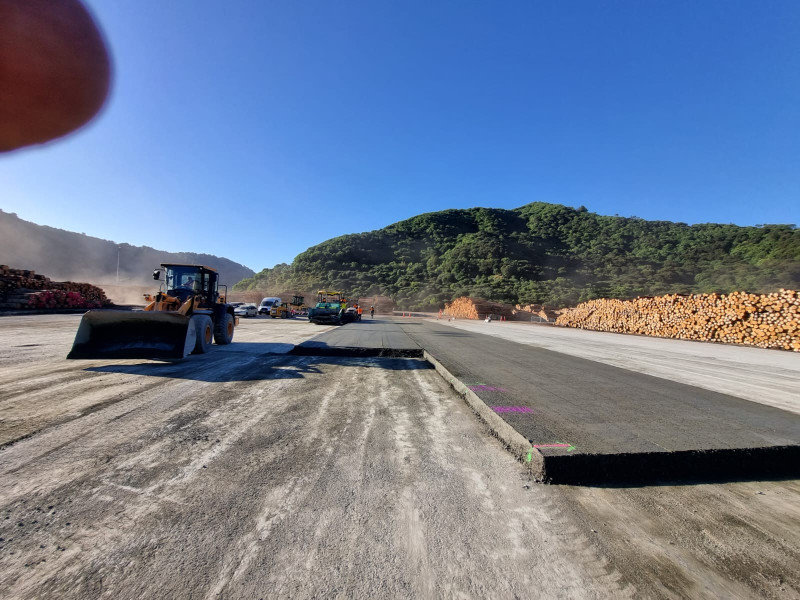New heavy-duty pavement system from Firth reduces carbon footprint
Innovation is something Firth prides itself on. So when the first trials of roller compacted concrete (RCC), a durable and fast construction solution for heavy duty pavements, were undertaken in New Zealand in 2020, Firth wanted to be involved and set the pace in the industry by entering into a partnership with Rolco New Zealand to introduce this sustainable paving method to the New Zealand market.
Willem de Bod, Managing Director for Rolco, says, “Firth chose to come on board as a partner early on which was a no brainer for me. It made sense because of their nationwide coverage, their renowned technical expertise and the fact we just got on very well. I am excited the see how our partnership will shape the future of New Zealand's road and pavement industry, especially with developing more sustainable construction methods.”
“This new technology is another string to our bow,” says Dominic Sutton, Head of Southern for Firth. “We see a very bright future for RCC as we continue to look for ways to become a more sustainable business.”
“Our first major trial for RCC was for Ports of Marlborough at Picton,” says Dominic. “We situated the plant in Blenheim to supply a timber (log) storage area for the Ports of Marlborough located at Shakespeare Bay Picton. We had completed a smaller trial in a winery in Blenheim, which ironed out some of the kinks, prior to commencing the project for Ports of Marlborough.”
“Of course tackling new technology and equipment meant it was tough at first, but it was very rewarding to see our team take on the challenge and in the end produce an amazing result,” says Carl Trollip, Plant Manager for Firth Blenheim, “All in all, the project has been a huge success.”
“Some Councils around the country have asked for trials on regional roading for early 2023,” adds Willem. “We may be paving over an existing asphalt surface which is absolutely possible and very exciting. Watch this space!
Do you have a large area, 10,000m2 or 3000m3, that requires paving? RCC is quick to lay, cost effective and a very durable heavy duty pavement system. Speak to Firth today about Roller Compacted Concrete.
Ph: 0800Firth1 or email: info@firth.co.nz.
Want to know more? The big questions answered…
What is Roller Compacted Concrete?
A concrete process that is a durable and a fast construction solution for heavy duty pavements. It gets its name from the method of construction used to place the material. RCC uses an almost zero-slump mix that is then mechanically placed with a paving machine. Just like asphalt, it is laid and then roller compacted.
Where can RCC be used?
Industrial yards; container yards; airport runways; heavy duty pavements; high load applications; intermodal pavements; log yards; parking lots; farm tracks, feed pads; road base/surfacing, highway base strengthening and hard stands.
How does it work?
The specialised mix is mixed in a central mixing plant. Firth has four central mix plants around the country and a mobile plant which can be located where required. The mix is delivered to site by standard bulk truck and trailer units. The specialised laying machinery will be brought to site and can be delivered around the country within a few days.
How many m2 metres can be laid in a day?
Up to 2,000m2 per day.
How long will it take to dry / cure?
|
|
RCC |
Standard Concrete |
|
To walk on |
Immediately |
48 hours |
|
Light weight traffic |
48 hours |
7 days |
|
Heavy duty traffic |
3 - 7 days |
28 days |
What thickness of pavement can be laid?
From 100mm to 230mm depending on requirements. A second layer can be laid on top of a fresh layer creating a pavement thickness greater than 230mm.
Can you lay RCC over an existing asphalt paved surface?
Yes
What makes RCC a better sustainable option with a lower carbon footprint?
Strength of concrete is driven by the water : cement ratio. The lower the volume of water that is used in the concrete, the less cement is required for a given strength. Due to the placing and compaction methods employed in RCC concrete, the mix is placed at a zero slump, so no additional water for workability is added and a larger size aggregate, which, also requires less water and therefore less cement in the mix, is used. The roller compaction of this mix tightly compacts the aggregate which aids in mechanical interlock of the aggregates resulting in higher flexural strengths, a primary concern for industrial pavements. Less cement (by 100 kgs per cubic metre of concrete) means a far lower carbon footprint. RCC also does not require the use of steel or steel mesh.

How much water does RCC use per m3 of concrete?
One cubic metre of standard 19mm 40MPa concrete at a 140mm slump requires 180L of water vs one cubic metre of 40MPa RCC which uses only 125L of water, meaning 100 kg less cement per m3.
Why is RCC more durable?
“Durability really refers to how long the pavement will last,” says Trevor Sawyer, Technical Manager, Fletcher Building. “Will it stand the test of time and is it functional for its purpose? Because all the aggregates are all locked up by the compaction, and there is very little water and an equally low cement content, this concrete is not prone to the shrinkage of normal concrete. There is also no steel reinforcing so there is no risk of anything getting in there and breaking it up due to steel corrosion. Because a relatively large aggregate is used, and all the aggregates are locked up by the compaction, a RCC pavement has a high abrasion resistance and is extremely durable.”
“In terms of cement efficiency RCC delivers a significantly higher strength concrete than normal concrete for equal cement contents. Put simply, the more water we use the more cement we need to use to achieve a given strength. The more cement and water we use the more the concrete is prone to shrinkage, creep, curling - to name a few. Properly placed and compacted roller compacted concrete has the lowest use of cement per cubic metre for a given strength, and the lowest GWP per cubic metre of concrete”
“Because we design this concrete with no steel there is no risk of corrosion or the steel deteriorating and causing problems later. RCC really comes into its own in marine environments such as ports or where there is high chorine or salt that would normally affect steel reinforced concrete. With the absence of steel, we can expect far better durability and a longer service life from the concrete than competing products.”
What is more cost-effective? Standard concrete or RCC?
Due to the need to get specialised equipment to the project site, the point where RCC becomes more cost effective is for projects over 10,000m2 of paved surface or 3,000m3 of concrete required. The other major driver in cost would be usable time where RCC can deliver a trafficable pavement in a far shorter time period with no extended waiting times, traditional with standard reinforced concrete pavements.
Flexural strength concrete explained
“Flexural strength is the pavement’s ability to carry a load and critical to how soon we can traffic it,” explains Trevor. “Flexural strength in normal concrete is very low compared to compressive strength. With the correct selection of aggregates and the use of compaction equipment the flexural strength we are obtaining for RCC is more than double that of traditional concrete for the same strength. It’s the nature of the aggregate and how they interlock. The compaction forces all the shapes edges and angles to lock into each other and that is what is driving our high flexural strength.”
“The flexural strength for a standard 40MPa concrete is typically between 4 - 4.8Mpa. RCC flexural strength is over 7.5Mpa which we are achieving in just 7 days with a significantly lower cement content than normal concrete!”
Specialist placing technology and methodology
“For the pavement to be able to withstand the weight of a roller this system requires specialist placing technology and methodology,” Trevor says. “There’s a real science behind the technology which takes into account the size of aggregate used, along with the amount of water and cement required to create a zero-slump mix that can still be fully compacted to full placement depth. It’s a very technical product with a lot of science behind it, which Firth has the capacity to develop and support.”
